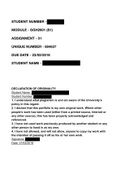STUDENT NUMBER - 60593695
MODULE - GGH2601 (S1)
ASSIGNMENT - 01
UNIQUE NUMBER - 884637
DUE DATE - 23/02/2018
STUDENT NAME - MICHAELA MANICOM
DECLARATION OF ORIGINALITY
Student Name: Michaela Margaret Manicom
Student Number: 60593695
1. I understand what plagiarism is and am aware of the University’s
policy in this regard.
2. I declare that this portfolio is my own original work. Where other
people’s work has been used (either from a printed source, Internet or
any other source), this has been properly acknowledged and
referenced.
3. I have not used work previously produced by another student or any
other person to hand in as my own.
4. I have not allowed, and will not allow, anyone to copy my work with
the intention of passing it off as his or her own work.
Signature: M.M.M
Date: 21/02/2018
, Question 1
Today, Earth and all that inhabit it are already suffering from numerous environmental
issues and it is only getting worse. Carrying capacity is the threshold point of stability of an
area, it is the maximum point at which an area can sustain a population without the
environment being degraded (Middleton 2013:60). If a particular area has exceeded its
carrying capacity, it is overpopulated. The world’s population has already surpassed 7
billion people and is continually increasing at a rapid rate (Ruz 2011). These billions all
need food and water to survive. They need shelter, land, air to breathe, families, jobs and
modes of transport. Resources are under extreme pressure to support every individual.
Resources that are near complete exhaustion are: water, oil, natural gas, phosphorus, coal
and rare earth elements (Ruz 2011). Earth consists of 70% of water with roughly 2.5%
being fresh water with only 0.3% not in the form of ice. The Food and Agriculture
Organisation of the United Nations predicts that 1.8 billion people will not have access to
water by 2025 (Ruz 2011). People are reckless with their resource consumption, assuming
the supply is infinite - they only begin conservation once it is too late, they are not
educated enough on how severe the problem already is. Resources needed for day to day
life are rapidly depleting causing a major increase in prices (such as food), resulting in
more people unable to afford the cost of survival. Majority of the population are
increasingly suffering from poverty, famine, crime and pollution. With too many families
unnecessarily expanding at exponential rates (especially in poor areas such as Sub-
Saharan Africa), resources are being completely exhausted and exploited by the masses
before they are able to self-regenerate at their linear rate.
Question 2
There are many components that contribute to the development of a region. According to
the UNDP (2016), human development is defined as “a process of enlarging people’s
choices”. The Human Development Index (HDI) is a measurement of a country’s level of
development over a long period of time, derived from three dimensions: standard of living,
life expectancy and access to knowledge (Gaye 2011). If a country’s population is
increasing at a rapid rate, the supply of a country’s resources cannot meet its increasing
demand. Access to knowledge is measured by mean years of schooling and expected
years of schooling. Quality education is vital in the development of the future generation. If
classrooms become over crowded, the quality of learning decreases. Teachers aren’t able
to attend to each individual’s needs while the differences in educational strength become
too vast and unattainable. Overpopulation can decrease a country’s life expectancy (at
birth), everyone is in competition with one another for survival. More people are in need of
jobs, food, water and land. Crime arises along with poverty and famine. With so many
individuals being exposed to starvation, diseases and violence - life expectancy will
undergo a substantial reduction. If earth’s natural resources are finite, yet of such an
abundant supply - a steadily increasing population shouldn’t a problem. Yet, population
isn’t growing at a steady rate. It is growing exponentially, as it gets larger over time, what is
left of our vast supply of finite resources has to supply more people. Standard of living will
decrease as there are more limits on resources. Gross Domestic Product (GDP) is the





